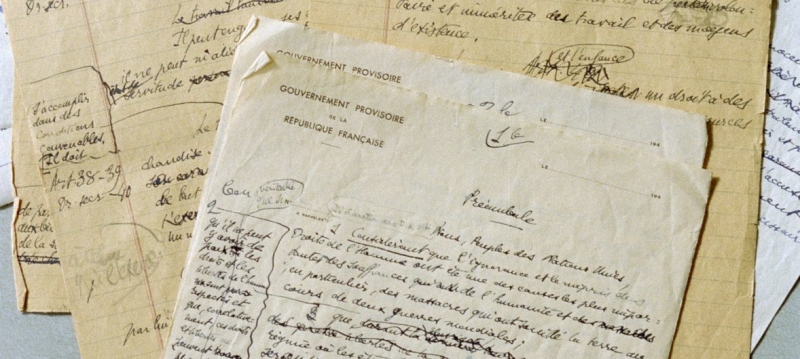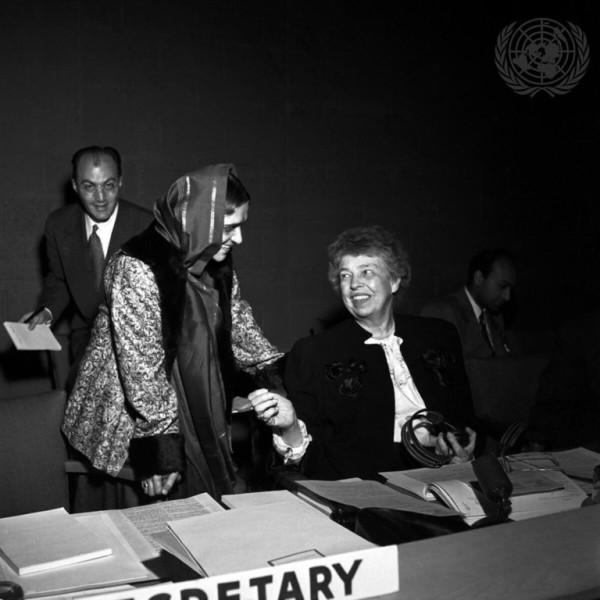
Drafts of the first versions of the Universal Declaration of Human Rights. During the process, 150 amendments were proposed to the text. Women who contributed to the creation of the Universal Declaration of Human Rights Human Rights
On the day of the adoption of the Universal Declaration of Human Rights, December 10, 1948, special congratulations were addressed to Eleanor Roosevelt. Known for her active social position, the former First Lady of the United States considered the Declaration to be her brainchild. Eleanor Roosevelt is not the only woman who contributed to the work on this historical document.
Eleanor Roosevelt, USA
“We are witnessing a great event, both for the United Nations and for all people,” said Eleanor Roosevelt, speaking in Paris. “The Universal Declaration of Human Rights may become a fundamental document for all mankind. We believe that its adoption by the General Assembly is comparable in significance to the adoption of the Declaration of the Rights of Man by the French people in 1789, the Bill of Human Rights in the United States, and similar documents in other countries.”
In 1946, US President Harry Truman appointed Eleanor Roosevelt to represent the country in the United Nations General Assembly in 1946. Before that, she served as the First Lady of the United States from 1933 to 1945.

Eleanor Roosevelt, Chairperson of the UN Commission on Human Rights, and Hansa Mehta of India, Delegate to the UN Commission on Human Rights.
Roosevelt became the first Chairperson of the Commission on Human Rights and played a pivotal role in the creation of the Universal Declaration of Human Rights. In the context of growing tensions between East and West, Eleanor Roosevelt guided the drafting process of the Declaration to its successful conclusion, relying on the enormous authority and trust she enjoyed with both superpowers. In 1968, she was posthumously awarded the United Nations Prize in the Field of Human Rights.
Roosevelt was not, of course, the only woman to play a major role in the creation of the Declaration. Women from all over the world contributed to this historic document.
Hansa Mehta, India
Hansa Mehta of India, who was the only woman delegate to the UN Commission on Human Rights in 1947-48, was a staunch advocate for women’s rights in India and beyond. She is best known for replacing the phrase “All men are born free and equal” with “All human beings are born free and equal” in Article 1 of the Universal Declaration of Human Rights.
Minerva Bernardino, Dominican Republic
Diplomat and feminist leader from the Dominican Republic, Minerva Bernardino was among those who championed the inclusion of the phrase “equal rights of men and women” in the preamble to the Universal Declaration of Human Rights.
Along with other Latin American women (Berta Lutz from Brazil and Isabel de Vidal from Uruguay), she also played a vital role in including the principle of gender equality in the UN Charter, which in 1945 became the first international treaty to recognize equal rights for men and women.
Begum Shaista Ikramullah, Pakistan
As a delegate to the Third Committee of the General Assembly on Social, Humanitarian and Cultural Questions, which in 1948 spent 81 meetings discussing the draft Universal Declaration of Human Rights, Begum Shaista Ikramullah of Pakistan advocated that the Declaration emphasize the principles of freedom, equality and choice. She fought for the inclusion of Article 16 on equal rights in matters of marriage, which she saw as a tool to combat child and forced marriage.
Bodiel Begtrup, Denmark
Bodil Begtrup of Denmark, Chairperson of the Sub-Commission on the Status of Women in 1946 and the Commission on the Status of Women in 1947, advocated that the words “all” and “everyone” in the Universal Declaration refer to all persons entitled to rights, rather than to “all men”. She also proposed that Article 26, on the right to education, include minority rights, but her ideas were too controversial at the time. The Declaration does not explicitly mention the rights of minorities, but all people are guaranteed equal rights.
Read also:
STORY How the Universal Declaration of Human Rights was born
Marie-Hélène Lefaucheux, France
Marie-Hélène Lefaucheux of France, Chairperson of the Commission on the Status of Women in 1948, successfully lobbied to include non-discrimination on the basis of sex in Article 2. The final text of the article states: “Everyone is entitled to all the rights and freedoms set forth in this Declaration, without distinction of any kind, such as race, colour, sex, language, religion, political or other opinion, national or social origin, property, birth or other status.”
Evdokiya Uralova, Byelorussian SSR
Evdokiya Uralova of the Byelorussian Soviet Socialist Republic was rapporteur of the Commission on the Status of Women to the Commission on Human Rights in 1947. She was a vocal advocate for equal pay for women and men. Thanks to her, Article 23 states: “Everyone, without any discrimination, has the right to equal pay for equal work.” Along with Friederike Kalinowska of Poland and Elizaveta Popova, representing the USSR, she also promoted the rights of persons in Non-Self-Governing Territories (Article 2).
Lakshmi Menon, India
Lakshmi Menon, India’s delegate to the Third Committee of the General Assembly in 1948, was a strong advocate of the multiple references to non-discrimination on the basis of sex throughout the text of the Universal Declaration of Human Rights, as well as the reference to “the equal rights of men and women” in the preamble.
She was also an advocate of the “universality” of human rights, strongly opposing the notion of “colonial relativism” that was used to to deprive people living in countries under colonial rule of their rights. She argued that if women and people under colonial rule were not explicitly mentioned in the Universal Declaration, they would not be considered to be included in the “everyone.”
